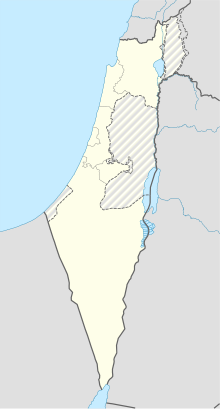This article's lead section may be too short to adequately summarize the key points. (September 2021) |
עקרון عقرون | |
 | |
| Alternative name | Tel Miqne, Tel Mikne, Khirbet el-Muqanna |
|---|---|
| Location | Israel |
| Region | Levant |
| Coordinates | 31°46′44″N 34°51′00″E / 31.778890°N 34.8499203°E |
| History | |
| Periods | Chalcolithic - Iron Age |
| Cultures | Philistine, Israelite |
| Site notes | |
| Archaeologists | Trude Dothan and Seymour Gitin |
Ekron (Philistine: 𐤏𐤒𐤓𐤍 *ʿAqārān,[1] Hebrew: עֶקְרוֹן, romanized: ʿEqrōn, Arabic: عقرون), in the Hellenistic period known as Accaron (‹See Tfd›Greek: Ακκαρων, translit. Akkarōn)[2][3] was a Philistine city, one of the five cities of the Philistine Pentapolis, located in present-day Israel.
In 1957, Ekron was first identified with the mound of Tel Miqne (Hebrew) or Khirbet el-Muqanna (Arabic), near the depopulated Arab village of 'Aqir, on the basis of the large size of the Iron Age archaeological remains;[4][5] the judgement was strengthened by the discovery in 1996 of the Ekron inscription.[6] The tell lies 35 kilometres (22 mi) west of Jerusalem, and 18 kilometres (11 mi) north of Tel es-Safi, the almost certain site of the Philistine city of Gath, on the grounds of Kibbutz Revadim on the eastern edge of the Israeli coastal plain.
- ^ Ahituv, Shmuel (2008). Echoes from the Past: Hebrew and Cognate Inscriptions from the Biblical Period. Carta. pp. 338–9. ISBN 978-965-220-708-1.
- ^ 1 Maccabees 10:89
- ^ Accaron, at Bible Study Tools
- ^ NAVEH, J. (1958). "Khirbat al-Muqanna'—Ekron: An Archaeological Survey". Israel Exploration Journal. 8 (2): 87–100. JSTOR 27924729.
- ^ NAVEH, J. (1958). "Khirbat al-Muqanna'—Ekron: An Archaeological Survey". Israel Exploration Journal. 8 (3): 165–170. JSTOR 27924741.
